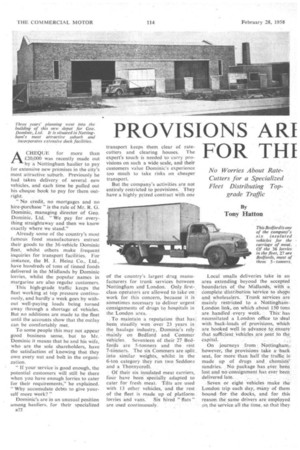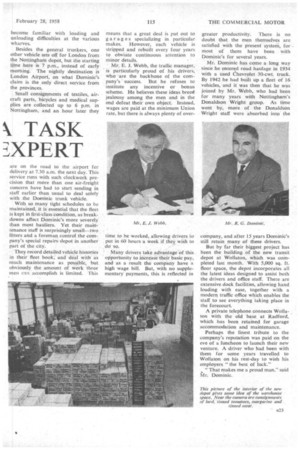PROVISIONS ARI k TASK FOR THI
Page 56

Page 57

If you've noticed an error in this article please click here to report it so we can fix it.
7LXPERT
No Worries About RateCutters for a Specialized Fleet Distributing Topgrade Traffic
By
Tony Hatton
ACHEQUE for more than £20,000 was recently made out by a Nottingham haulier to pay for extensive new premises in the city's most attractive suburb. Previously he had taken delivery of several new vehicles, and each time he pulled out his cheque book to pay for them outright.
" No credit, no mortgages and no hire-purchase "is the rule of Mr. R. G. Dominic, managing director of Geo. Dominic, Ltd. "We pay for everything straightaway and then we know exactly where we stand."
Already some of the country's most famous food manufacturers entrust their goods to the 36-vehicle Dominic fleet, whilst others make frequent inquiries for transport facilities. For instance, the H. J. Heinz Co., Ltd., have hundreds of tons of tinned foods delivered in the Midlands by Dominic lorries, whilst the popular names in margarine are also regular customers.
This high-grade traffic keeps the fleet working at top pressure continuously, and hardly a week goes by without well-paying loads being turned away through a shortage of vehicles. But no additions are made to the fleet until the accounts show that the outlay can be comfortably met.
To some people this may not appear good business sense, but to Mr. Dominic it means that he and his wife, who are the sole shareholders, have the satisfaction of knowing that they own every nut and bolt in the organization.
"If your service is good enough, the potential customers will still be there when you have enough lorries to cater for their requirements," he explained. "Why accumulate debts to give yourself more work? "
Dominic's are in an unusual position among hauliers, for their specialized B22 transport keeps them clear of ratecutters and clearing houses. The expert's touch is needed to carry provisions on such a wide scale, and their customers value Dominic's experience too much to take risks on cheaper transport.
But the company's activities are not entirely restricted to provisions. They have a highly prized contract with one
of the country's largest drug manufacturers for trunk services between Nottingham and 'London. Only firstclass operators are allowed to take-on work for this concern, because it is sometimes necessary to deliver urgent. consignments of drugs to hospitals in the London area.
• To maintain a reputation that has been steadily won over 23 years in the haulage industry, .Dominic's rely mainly on Bedford and Commer vehicles., Seventeen of their 27 Bedfords are 5-tonners and the rest 7-COrmers. The six Commers are split _ into similar weights, whilst in the 6-ton category they run two Seddons and a Thornycroft.
Of their six insulated meat carriers, four have been specially adapted to cater for fresh. meat. Tilts are used with 13 other vehicles, and the rest of the fleet is made up of platform lorries and vans. Six hired " flats " are used continuously. Local smalls deliveries take in an area extending beyond the accepted boundaries of the Midlands, with a Complete distribution service to shops and wholesalers. Trunk services are mainly restricted to a NottinghamLondon link, on which about 150 tons
are handled every week. Thishas necessitated a London office to deal with back-loads of provisions, which are booked well in advance to ensure that sufficient vehicles are „sent to the capital.
On journeys from Nottingharn,, however, the provisions take aback, seat, for more than half the traffic is made up of drugs and chemists' sundries. No package has ever been lost and no consignment has ever been delivered late.
Seven or eight vehicles make the London trip each day, many of them bound for the docks, and for this reason the same drivers are employed or the service all the time, so that they become familiar with loading and unloading difficulties at the various wharves.
Besides the general trunkers, one other vehicle sets off for London from the Nottingham depot, but the starting time here is 7 p.m., instead of early morning. The nightly destination is London Airport, on what Dominic's claim is the only direct service from the provinces.
Small consignments of textiles, aircraft parts, bicycles and medical supplies are collected up to 6 p.m. in Nottingham, and an hour later they are on the road to the airport for delivery at 7.30 a.m. the next day. This service runs with such clockwork precision that more than one air-freight concern have had to start sending in staff earlier than usual to deal solely with the Dominic trunk vehicle.
With so many tight schedules to be maintained, it is essential that the fleet is kept in first-class condition, as breakdowns affect Dominic's more severely than most hauliers. Yet their maintenance staff is surprisingly small--two fitters and a foreman control the company's special repairs depot in another part of the city.
They record detailed vehicle histories in their fleet book; and deal with as much maintenance as possible, but obviously the amount of work three men can accomplish is limited. This
means that a great deal is put out to g a r a-g e s specializing in particular makes. However, each vehicle is stripped and rebuilt every four years to obviate continuous attention to minor details.
Mr. E. J. Webb, the traffic manager, is particularly proud of his drivers, who are the backbone of the company's success. But he refuses to institute any incentive or bonus scheme. He believes these ideas breed Jealousy among the men and in the end defeat their own object. Instead, wages are paid at the minimum Union rate, but there is always plenty of over time to be worked, allowing drivers to put in 60 hours a week if they wish to do so.
Many drivers take advantage of this opportunity to increase their basic pay, and as a result the company have a high wage bill. But, with no supplementary payments, this is reflected in
greater productivity. There is no doubt that the men themselves are satisfied with the presenf system, for most of them have been with Dominic's for several years.
Mr. Dominic has come a• long way since he entered road haulage in 1934 with a used dhevrolet 30-cwt. truck. By 1942 he had built up a fleet of 16 vehicles, and it was then that he was joined by Mr. Webb, who had been for many years with .Nottingham's Donaldson Wright group. As time went by, more of the Donaldson Wright staff were absorbed into the
company, and after 15 years Dominic's still retain many of these drivers. But by far their biggest project has been the building of the new transit
depot at Wollaton, which was completed last month. With 5,000 sq. ft.
floor space, the depot incorporates all the latest ideas designed to assist both the drivers and office staff. There are extensive dock facilities, allowing hand loading with ease, together with a modern traffic office which enables the staff to see everything taking place in the forecourt.
A private telephone connects Wollaton with the old base at Radford, which has been retained for garage accommodation and maintenance.
Perhaps the finest tribute to the company's reputation was paid on the eve of a luncheon to launch their new venture. A driver who had been with them for some years travelled to Wollaton on his rest-day to wish his employers "the best. of luck."
"That makes me a proud man," said Mr. Dominic.




















































































































